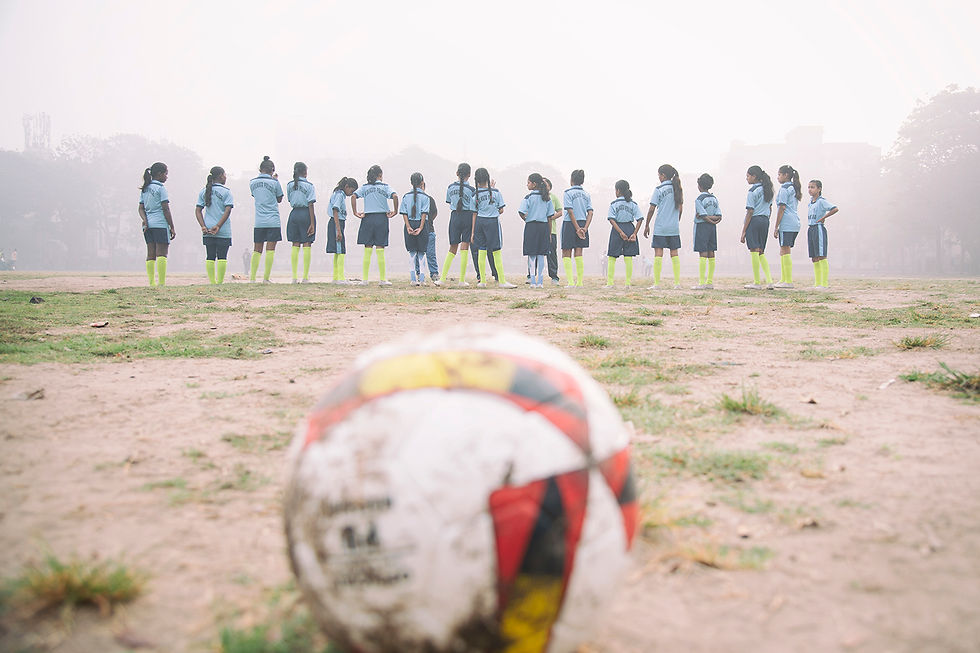Dribbling Past Patriarchy

In the early morning fog, a group of teenage girls in jerseys and fluorescent yellow socks stand in an open field. In the foreground lies a grimy ball and a goal post—its makeshift net newly fixed. In the distance, the girls stand in a line, spaced unevenly, some with hands clasped, seeming unsure about what is to happen, yet leaning in intently. Many are about to play football for the first time in their lives.

Sonia Khatoon: Football is socially constructed as “masculine”. But coming from a conservative community, Sonia Khatoon challenged her cultural & gendered identity and came up against considerable obstacles. She had to face a subtle criticism when she started playing the game where her community people including her own mother opined about her playing football wearing shorts.

Tecoma flowers, carried by the girls lie on the field after a game. is perceived as a very masculine game. But a woman is considered to be as delicate as a flower in the society. This picture depicts those flowers on the field .

In the early morning fog, a group of teenage girls in jerseys and fluorescent yellow socks stand in an open field. In the foreground lies a grimy ball and a goal post—its makeshift net newly fixed. In the distance, the girls stand in a line, spaced unevenly, some with hands clasped, seeming unsure about what is to happen, yet leaning in intently. Many are about to play football for the first time in their lives.
My project Dribbling Past Patriarchy, explores what it means for women to be playing football in a society that continues to constrict them. Yet, they also make visible external power dynamics, placing the women in a large open field that becomes a metaphor for their story. Football is a very popular game in Bengal. However, it is customary to see boys in local neighbourhoods kicking a ball in the open, out in the afternoon sun. But societal norms more routinely keep women indoors. In many ways, this is what makes girls playing football a small act of subversion and defiance. I started working with an NGO in 2018 who were opening football camps across Bengal to empower the girl child from marginalized sections of the society. Some have dropped out of school because their parents chose to educate their boys over the girls, others have been forced to stay home and be confined to household chores, physical abuse, domestic violence, trafficking, early marriage these are the common issues they face in underprivileged environment. My work grapples with a paradox at the heart of gender realities: the liberty to be forthrightly a woman, to not have to hide or subdue your womanhood, nor be compelled to lose its visible markers, and yet to not be defined by it, or reduced to it—to inhabit that often elusive space where one is truly freed. It is this search for freedom and self-expression that drives the girls to football. Patriarchy has implications in both men’s and women’s own experiences as well. It is a system that insists that males are inherently superior and have the right to dominate everyone deemed weak, especially females. Some girls often stop coming to football practice. Making girls strong and united is against social norms. As girls they are not supposed to play the boys’ game. This message is often silent but clear. The psychological threat is powerful enough to dissuade the girls from what had been their favorite activity . Many girls of the tribal villages of Bengal are the first generation learners. If sports is considered as a professional goal in a girl’s career, then these first generation learners stand equal chance in establishing themselves in life. If their sports talents are nurtured professionally, then these girls can climb up the socio-economic pyramid quite efficiently. Encouraging girls into sports at a young age, and giving them a healthy foundation and infrastructure is the only way for them to fight all odds of the society and shine.
Paromita Chatterjee/Documentary Photographer